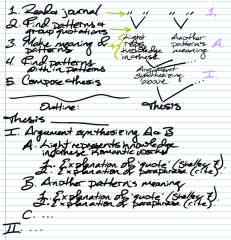Excellent discussions over the past few days! Glad to see we’re back in the swing of things. Below is a short overview of our goals this week and how they tie into the ultimate goal: writing the final paper. If you have questions, post them below, send me an email, stop me in the hall, or ask in class. This is confusing because it is new; don’t be ashamed if you feel like you aren’t getting it. That’s a sign that you’re learning. Keep asking questions until it clicks.
The assignment, as mentioned previously, is to write an essay answering the following question: In what ways is  Frankenstein a Romantic work?
In other courses the teacher may lecture over the Romantic Era and ask you to apply your notes to the novel. ((FYI, this is an example of a deductive exploration/explanation. The teacher gives you a definition, you assert whether or not an example (the novel) matches that definition.)) This is all well and good, but you guys need a challenge. Rather than providing you with a definition of Romanticism, I am asking you to note the themes of a number of Romantic works (the “Frankensources” packet) and use those to come up with a working explanation of the Romantic ethos. ((This is informal inductive reasoning; those who have played with the scientific method before will recognize the pattern.)) You will then use those to support your claims about Frankenstein‘s romanticism.
Today we began with very basic patterns—assertions of mankind’s apparent greatness, the importance of creativity, light-as-knowledge imagery, etc.—and played with how we could tie them together. It is important to realize that there aren’t any “wrong” answers here, just poorly supported ones. You can check the validity of your pattern by finding it elsewhere in the packet, or by finding other symbols arguing something similar. If all signs are pointing to the importance of a person’s humility and you find arguments in favor of man’s godlike nature, go back through your notes to see if you missed something. Or ask during class. Asking is always good.

